Participants in High Level Dialogue: "The Growth of Lake Enriquillo: Environmental, Social and Scientific Implications" Affirm that Relocation of Families Affected by the Rise of Lake Enriquillo is a Priority
New York, July 30, 2012
On Saturday, July 28, Global Foundation for Democracy and Development (GFDD), and its sister institution in the Dominican Republic, Fundación Global Democracia y Desarrollo (FUNGLODE), partnered with the City College of New York (CCNY) and the Instituto Tecnológico de Santo Domingo (INTEC) to organize the high level dialogue “The Rise of Lake Enriquillo: Environmental, Social and Scientific Implications,” from 9:00 am to 5:30 pm at FUNGLODE Headquarters in Santo Domingo.
53 representatives from public, private and non-governmental institutions participated in the high-level dialogue which aimed at devising strategies to address the environmental and social implications of the rise of Lake Enriquillo.
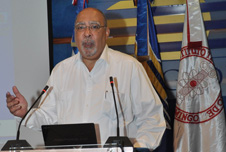
“The Ministry of Agriculture identified 3,332 hectaresto be devoted for the relocation of agricultural workers and families affected by the rise of Lake Enriquillo. The solution is to not remove or impede that water enter the lake. The solution is relocate the people residing in affected areas,” stated the agricultural engineer and specialist in natural resource management, José Alarcón.
Alarcón, representing Universidad Autónoma de Santo Domingo (UASD), delivered the presentation “The Impact of the Flooding Phenomenon of Lake Enriquillo in the Agrofishery Sector.” The expert confirmed that the strategy to confront the effects of the rise of Lake Enriquillo should focus on territorial reorganization, the relocation of communities located in vulnerable zones and increased support for initiatives aimed at improving risk management.
“We need to raise awareness among inhabitants about the vulnerable zones so that they know where they are located and that they know how to respond to the natural phenomena that could occur,” he stressed. He also added that conditions of poverty have also led to the establishment of illegal squatter settlements in the areas surrounding the lake.
Solhanlle Bonilla, environmental economist and environmental management specialist, conveyed the need to relocate families that live in the provinces of Independencia and Bahoruco, the provinces nearest to the lake, due to the conditions associated with the water level rise.
She explained that, as of 2009, 55 percent of the population living in the province of Independencia had not completed primary education and that 26.8 percent of the population was unemployed. Meanwhile, in the province of Bahoruco, 51 percent of the inhabitants had not completed primary education and 34.8 percent of the population was unemployed.
She added that the data provided by the National Office of Statistics (ONE) and the United Nations Development Programme (UNDP) affirmed that 70.2 percent of the households in these zones are considered to be poor, reporting low levels of income.
Bonilla stated that as a consequence of the flooding, 90 percent of families lost plots of land where they had planted their crops and raised their cattle. This data is revealed in the 2011 study realized by the Project in Support of the Competitive Agri-food Transition (Proyecto de Apoyo a la Transición Competitiva Agroalimentaria (PACTA).
“This significantly affects the economy and security of families and the levels of malnutrition typical of the zone, as families had previously been reliant on sustainable agriculture to meet nutritional needs and had sold excess goods to subsist,” posited Bonilla.
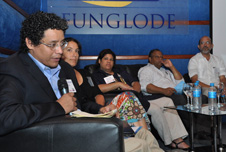
During the high-level dialogue, representatives from The City College of New York (CCNY) and the Instituto Tecnológico de Santo Domingo (INTEC) reported that they installed monitoring system to detect climatic and atmospheric variability. The monitoring system is comprised of 26 points distributed throughout 18 neighborhoods located in close proximity to Lake Enriquillo. The monitoring system has been financed by the National Fund for Innovation and Scientific and Technological Development (Fondo Nacional de Innovación y Desarrollo Cientifico Tecnologico (FONDOCyT) of the Ministry of Higher Education, of Science and Technology, CCNY and INTEC.
The monitoring system will complement other climate monitoring devices being utilized in these zones. This new system is able to detect additional indicators.
The event also featured the participation of Yolanda León, Faculty of Science, INTEC; Jorge E. González, Grove School of Engineering, CCNY; Ricardo González, Professor of Engineering INTEC; and Luis Cuevas, Operation of Risk Systems, INDRHI.
The conference was comprised of the following panel discussions:
“The Impact of the Flooding Phenomenon of Lake Enriquillo in the Agrofishery Sector”
José Alarcón, Faculty of Agronomic and Veterinary Sciences, UASD
“The Socioeconomic Impact of the Case of Lake Enriquillo and the Zones of Influence”
Solhanlle Bonilla, Researcher, INTEC
“The Effects of the Rise of Lake Enriquillo on Biodiversity: Preliminary Observations”
Yolanda León, Faculty of Science, INTEC
“The Nature of the Flooding of Lake Enriquillo during the 2000-2011 Period”
Luis Cuevas, Operation of Risk Systems, INDRHI
“Presentation of Technical Analysis”
Jorge González, Grove School of Engineering, CCNY, and Ricardo González, Professor of Engineering, INTEC
The high level dialogue also featured the participation of Lisa Staiano-Coico , President of The City College of New York (CCNY) and Rolando M. Guzmán, President of Instituto Tecnológico de Santo Domingo (INTEC).
Presentations:
José Alarcón
Solhanlle Bonilla
Yolanda León
Luis Cuevas
Jorge E. Gónzalez
Jorge E. Gónzalez & Ricardo Gónzalez
Related links:
www.muestracinemedioambientaldominicana.org
www.globoverdedominicano.org
www.diccionariomedioambiente.org
www.ccny.cuny.edu
www.intec.edu.do
www.uasd.edu.do
www.indrhi.gob.do
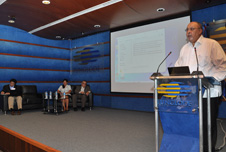
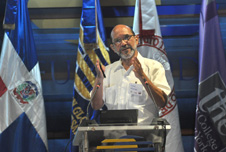
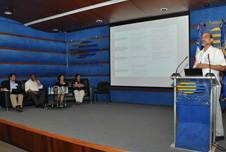
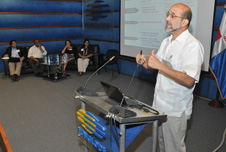
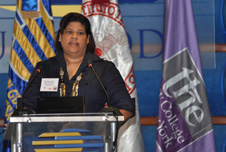
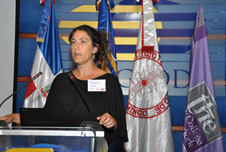
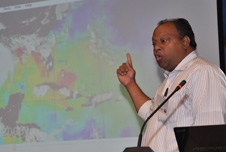
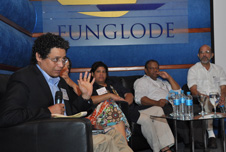


Community in Action!
Supporting grassroots organizations and communities
Among the goals of the DR Environmental Film Festival (DREFF), is to include and support grassroots organizations and communities, schools and young people in general.
Marcos Diaz
A real Universal Community leader and spokesman for the core values of the UN Millennium Development Goals as it is the Dominican swimmer Marcos Diaz. He will meet a group of youth, who will have a swimming competition, at La Caleta. The expected goals of this activity is to offer an opportunity to youth of disadvantaged areas to interact with Marcos, and to get a better understanding for the role model that Marcos represents for Dominicans and the rest of the world, as well as a better understanding of the sea and this protected area of La Caleta.For more details about Marcos Diaz visit Dominican Get-Together in the Big Apple
Trivias - Dominican Encyclopedic Dictionary of the Environment
to Promote DREFF Video



